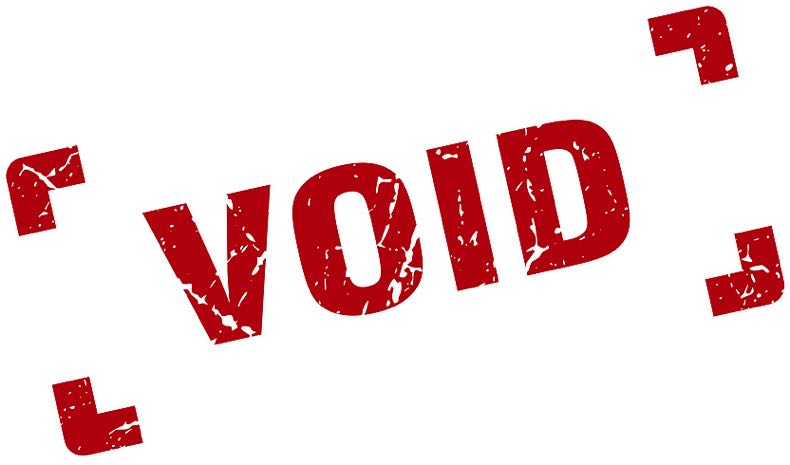 Bookies have a bad reputation in some quarters for a whole range of reasons but not paying out on winning bets is certainly one of the things that most annoys punters. There are a whole host of reasons that a site may refuse to pay out on what you believe is a winner, whilst they may also cancel some bets (which then go on to win) before the event has concluded.
Bookies have a bad reputation in some quarters for a whole range of reasons but not paying out on winning bets is certainly one of the things that most annoys punters. There are a whole host of reasons that a site may refuse to pay out on what you believe is a winner, whilst they may also cancel some bets (which then go on to win) before the event has concluded.
In this article, we will explain one legitimate reason they have for cancelling a bet or not paying out on a wager. Many punters will still feel it is unfair and, depending on how it is done, it may be, but a palpable error is the main reason you are likely to ever find yourself in this unfortunate position.
We will explain what it is, how and why it may come about and where the line lies between a palpable error and a bookmaker trying to avoid a payout. We’ll also look at what you can do if you feel you have been wronged. Finally, we’ll outline some of the most high profile “palps”, including the odd time the bookies stumped up when perhaps they didn’t have to.
What Is a Palpable Error?

One dictionary definition of the word palpable is “plain to see or comprehend”. In legal terms, a palpable error has been described as an error or mistake that is “easily perceptible, plain, obvious and readily noticeable.”
When it comes to palpable errors – sometimes referred to as “palps” – in the world of sports betting, the same sort of definition applies. It is an obvious and clear mistake that comes about not through a lack of judgement or knowledge on the bookie’s part, but from simple human error.
Odds Are the Wrong Way Around
Perhaps the most obvious type of palp is when the odds for teams, players or whatever else you might bet on are the wrong way round. This might happen in tennis, for example, where Novak Djokovic is available to back to win a match at 6/1 and the world number 452 is the short odds-on favourite. Equally in football, if you see Man City priced at 12/1 at home against Norwich, with the Canaries 1/5, you can safely assume that this is a palpable error.
It would be obvious to anyone with even the most basic knowledge of football that the odds were incorrect and that this error was not because the people making their odds had done a terrible job but simply because they had been imputed the wrong way round.
Zero Inadvertently Added to the Odds
Another typical example of a palpable error may be where a zero has inadvertently been added to the odds. So if you see Rory McIlroy priced at 160/1 to win the US Masters pre-tournament, when the other main contenders are priced at between 10/1 and 20/1, it is safe to assume that this is a palp and the real price was perhaps intended to be 16/1. Of course, there are many who would say that 160/1 is more like the real price!
Numbers the Wrong Way Round
Another not-uncommon way for a palp to occur is when the bookmaker gets their numbers the wrong way round. For example, if you want to back Palpy McPalpface in the 2.40 at Palpyfract, sorry, Pontefract, and you think 7/1 is an insanely good price at your favourite online bookmaker, you might pile in. If, however, most other betting sites have the red-hot favourite at 1/7, or odds around that, once again you can be pretty certain this is a palp.
These mistakes can occur in a range of other ways too, including due to technical issues, but the key point is that they are very obvious and have come about not through an error of judgement or a deliberate choice by the bookmaker, but due to a blunder. And let’s not forget that we all make plenty of those!
What Happens If You Back a Palp?

Whether you back a palp innocently or knowingly (we’ll come to that issue shortly), what happens? Well, there are many different scenarios that may play out, with the most common and straightforward being that the bookie realises their error and simply cancels/voids the wager.
Bet Voided
In an ideal world, an email or account message explaining what has happened would be nice and perhaps even an apology. But we don’t live in an ideal world so more than likely your bet will simply be voided, meaning you only realise if you notice the change in your balance or check “My Bets”.
In this instance, that is usually the end of the matter unless you decide to complain (again, more on that later). An alternative scenario might see you only be notified that the bet was a palpable error after it has settled. This can complicate matters as it has been known for a bookie to let bets run and if they lose, settle them as losing bets but if they win claim it was a palpable error. That said, we have also heard of bookies palping losing bets after they have settled and then refunding the stakes, so it is not always fair to assume the worst from our sworn adversaries, bookmakers!
Being Offered the Correct Odds
A third scenario may see the bet stand but at the correct odds, for example 1/8 on Djokovic, not the 6/1 you initially took. Again, in this instance, there may be varying degrees of communication. The gold standard of customer service, rectifying what was, after all, their error, would see the betting site contact you. They should explain what has happened and offer you the choice of either having your bet voided or letting it ride but at the correct odds.
Sadly, this is also quite uncommon and again you are open to the possibility that the bookie might palp a winning bet after the event but settle a losing wager at the correct, reduced price. There is, however, a final option that is at least favourable to the punter: the bookie simply lets the bet stand as normal.
Once again, irrespective of whether you were even aware that the odds and bet were a palpable error, there is a slim chance the bet will be settled in the normal way. It may be that the bookie does not realise they have made an error, or alternatively they may feel that their losses are acceptable and so rather than upset the punter they just take the hit.
What Should I Do If I See a Palp?

In our experience, this last course of action is the least likely and partly for this reason we generally advise not placing bets when it is clear the odds are a palpable error. The upside is relatively small given you are very unlikely to get paid at the full odds. In contrast, the potential downside is that you could end up with a bet that the bookmaker allows to run if it loses but voids as a palp if it wins. In addition, the bookie may opt to close or at least limit your account (restricting the value of the bets you can place, often to very low sums).
Bookies Under No Obligation to Accept a Bet
This may seem unfair but they are under no obligation to accept a punter’s bets and it is understandable that they might choose not to accept wagers from someone they believe is trying to take advantage of them. In contrast, we believe a better way to approach the situation is to contact the bookie via live chat (where available) and point out what you believe to be a palp.
Maybe the Odds are Actually Correct
It could be the case that for whatever reason the odds are actually correct, in which case you are free to place the bet and have it in writing that the odds are not a palpable error. However, assuming you have understood the market correctly, the odds probably are a palp. In this case, if you ask nicely you may get a free bet from the bookie for letting them know.
You have saved them from the possibility of issues and hassle with other customers so it is certainly a possibility. But even if they don’t reward your honesty and helpfulness, at least you know exactly where you stand and do not run the risk of having a bet that might settle as a loser with no genuine chance of being paid out even if it “wins”.
Can I Complain If My Bet Is Voided or Winnings Not Paid – And Should I?

In any dispute with a bookie, the first course of action should be to get in touch with them directly. If they have either voided a bet and you do not know why, a wager has disappeared from “My Account” entirely, or you have not received the winnings you expected (or any winnings at all), just get in touch. The customer service team can hopefully explain why this has happened and that will generally be the end of the issue.
If It’s an Obvious Error, Let It Go
If you have made a bet knowing it is a palpable error then there is really not much you can do if the bookie voids the bet ahead of the game, or even after the result. IBAS (the Independent Betting Adjudication Service, a third-party organisation that is the most recognised and authoritative when it comes to resolving issues between betting organisations and punters) are clear on this issue. They state that they “do not consider the principle of correcting obvious errors to be unfair” and also that they will look at “whether the error would have been discernible to a customer with a reasonable knowledge of betting and the sport in question.”
Given this, it is fairly clear that any complaint regarding your bet on Celtic beating Raith Rovers at 33/1, or a horse that should be a 2/1 favourite being priced at 20/1, will fall on deaf ears at IBAS. The only time you may have a valid case in the instance of an obvious error is where the bookmaker only “palps” it after the event. In this scenario, it could reasonably be argued that the bookmaker was waiting for it to lose and would not have voided it if it had.
IBAS Checks That Bookies Act Fairly
In all cases, however, IBAS “will check whether the rule has been implemented reasonably and fairly” and they also remark that they generally prefer and encourage bookmakers to allow bets to stand and settle them in line with the best price that was generally and correctly available at their rivals. Of course, if your bookie fails to communicate with you at any stage, this still leaves them able to keep losing stakes but fall back on the defence that they intended to pay you had you won.
Ultimately though, the key point here is that whether you made your bet in good faith or took a chance on a bet that you knew was a clear error, where it genuinely is a real error, you are unlikely to have any joy with a complaint. But how do we know what is a real palpable error or whether the bookie has just mispriced an event or been slow to react to new information?
Palp or Just Wrong Odds?
Much as IBAS are clear where they stand when it comes to the bookies’ side of thing and palps, they also note that the clause should not be used to help them with regards “errors of judgement or movements in the market they have failed to detect and respond to.” They are well aware that it would be all too easy for a betting site to cry “palp” when, in fact, they had simply mispriced a market, misunderstood something in relation to it or, for example, been tardy in changing their odds in the light of a new a weather forecast, team news or another piece of fresh information.
Of course, judging what type of mistake has occurred is not always clear-cut. As said, if you back a well-known favourite at huge odds when the underdog is odds-on, you can be pretty sure it is a bona fide palpable error. On the other hand, if odds are significantly out of line compared to other bookies this does not automatically mean it is a palp. If you are betting on the draw in a Test match (cricket), most bookies may have the draw priced at evens, whilst you see one offering it at 4/1. It may well be the case that the other sites had it at 4/1 but have changed their prices to reflect a new rainy forecast on the last day. Just because a bookmaker has been slow in reflecting the new forecast in the prices does not make it a palpable error.
In the unlikely event that a bookie voided your bet or refused to pay or paid at reduced odds, you would have a very good case with IBAS. The independent body will request evidence from the bookmaker to support any claim that a misprice was a palpable error. The vast majority of times it will be obvious though and in fairness bookies do tend to take it on the chin if they happen to be slow to update their odds or simply call things wrong.
Especially if you stick to the big, respectable and highly trustworthy sites that we work with, seeing a legitimate bet treated as a palp is unlikely to be an issue. As with many things in life though, in general, if something looks too good to be true, maybe it is?
Real Life Palpable Errors
If you frequent any betting forum or sit in a sports pub for long enough you will probably hear someone unhappy that a bookmaker has not paid out on their bet, or has paid at reduced odds. One infamous example where reduced odds were paid involved there being snow at Christmas. Back in 2010 one punter thought they had landed a massive £7m win but only got £31. The bet was taken in error and was allowed to be placed as an accumulator when it should not have been. This is a slightly different scenario but the principle is really the same – where a bookmaker makes a legitimate and honest mistake, they do not always have to pay.
Another less spectacular case involved a time that Coral incorrectly offered odds of 18/1 on Tyson Fury to beat Deontay Wilder when the real price was 10/11. Whilst the amount at stake was less than £100 the punter still felt annoyed enough to go to the media about it. In truth, though, anyone who knew enough about boxing, or betting, to make a wager, would know that 18/1 was clearly an error.
Time the Bookie Did Pay
 Most times these things happen the bookmaker will void the bet citing a palpable error. However, there have been some noteworthy occasions that bookies have paid out when perhaps they didn’t have to. Yes, believe it or not, bookies paying out cold hard cash when they might have got away with doing otherwise.
Most times these things happen the bookmaker will void the bet citing a palpable error. However, there have been some noteworthy occasions that bookies have paid out when perhaps they didn’t have to. Yes, believe it or not, bookies paying out cold hard cash when they might have got away with doing otherwise.
US operator, FanDuel, eventually paid out a massive $82,000 on an obvious error. Back in 2018 they briefly offered the clearly incorrect odds of 750/1 on the Denver Broncos to beat the Oakland Raiders late in the fourth quarter. The Broncos are bad but, hey, not that bad!
The real odds should have been just 1/6 and after initially refusing to pay lucky punter Anthony Prince, from Newark (we presume Newark, New Jersey rather than Newark-on-Trent!), they decided they would honour his bet. They also paid another 11 punters who somehow grabbed the crazy odds, apparently deciding that in a fledgling market the good publicity was worth the hit. A FanDuel spokesperson said “sports betting is supposed to be fun. As a result of a pricing error this weekend, it wasn’t for some of our customers.” Yes, we would agree it should be fun and we would most certainly agree that landing an $82k palp would qualify as fun! Maybe you should be backing those palpable errors after all?!
